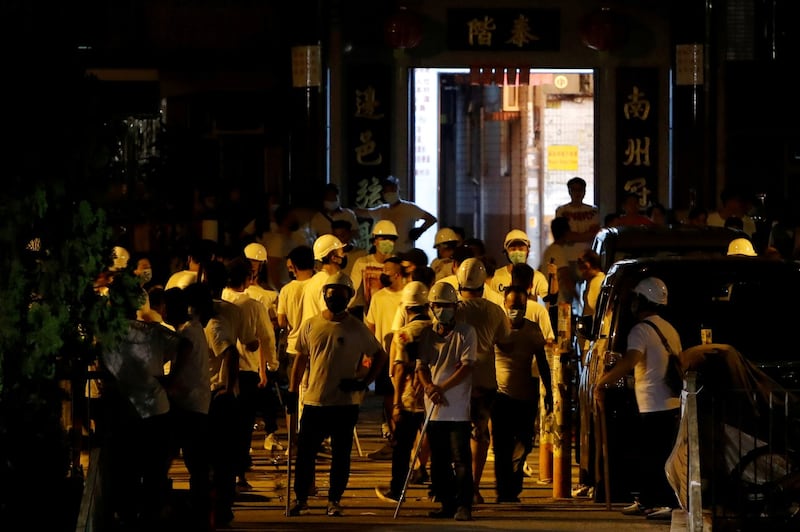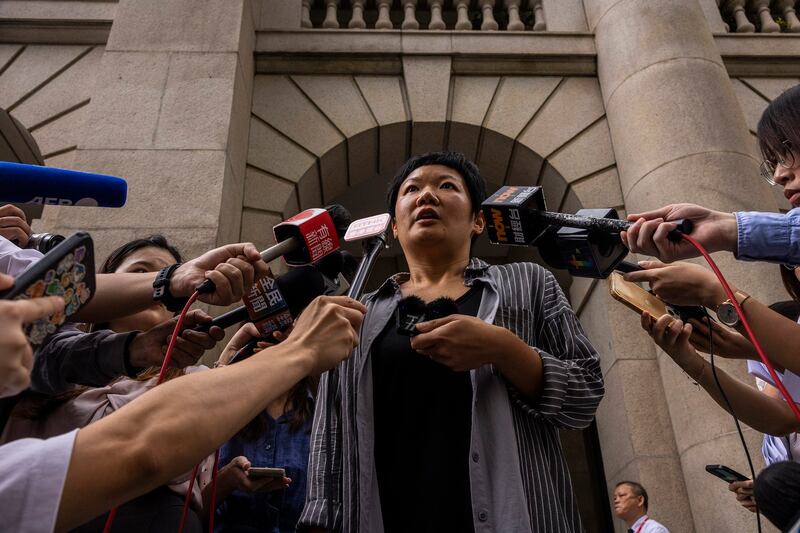In a rare ruling supporting press freedom in Hong Kong, a court overturned a conviction against investigative journalist Bao Choy, who had investigated the 2019 subway station attack by men in white T-shirts on civilians.
Choy was found guilty of "improper searches" of an online car license database in April 2021, after she used the site to access vehicle license plate ownership records for her documentary on the July 21, 2019, attacks at the Yuen Long MTR station.
She was fined HK$6,000 (US$770), and lost an appeal against the conviction at the High Court in November 2022.
But she won an appeal at the Court of Final Appeal, which said she had been wrongly accused of misusing the search function.
"It's been a long time since I had news this good," said Choy.
But she also alluded to the ongoing erosion of press freedom in Hong Kong, pointing to the "quiet disappearance of many things" in recent years.

"I don't think it's so easy to take away people's beliefs," Choy said. "The persistence [we have seen] over the last few years is already pretty meaningful."
In its written judgment, the court found that Choy’s use of the site had been due to “bona fide journalism.”
"The issues of falsity and knowledge were wrongly decided against the appellant because her journalistic investigation into the use of the vehicle on the dates in question did fall into the wide catchall category of ‘other traffic and transport related matters,” it said.
Hong Kong Exodus
Choy said she hoped the ruling would serve as an encouragement to journalists still working in Hong Kong, as many have joined an exodus of middle-class professionals, fleeing the current political crackdown and regrouping overseas.
At the time of her arrest, Choy was working for government broadcast Radio Television Hong Kong, producing documentary and investigative films for a weekly series titled “Hong Kong Connection.”
Choy's film showed that police were present as the attackers gathered in Yuen Long, but delayed their response for 39 minutes as men in white T-shirts started attacking train passengers at the MTR station.
The film used footage filmed by witnesses and security cameras – as well as number plate searches and interviews – to piece together events, uncovering links between some of the attackers and the staunchly pro-Beijing Heung Yee Kuk rural committees.

Choy's program also showed that stick-wielding men had been brought into the district in specific vehicles hours before the attack, and that police had done nothing about the build-up in numbers.
She was arrested after the documentary aired in November 2020, allegedly because her use of the government vehicle database wasn't for the permitted purposes.
Shift in how journalists are regarded
Choy told Radio Free Asia in November that there has been a fundamental shift in the way journalists are regarded in Hong Kong amid an ongoing crackdown on press freedom under the national security law.
"In the past, there was a belief that journalists had fourth estate rights, and that reports that used such services to verify information were legitimate," she said. "Society recognized and believed in the principle that certain events were a matter of public interest, so journalists had the right to access this kind of information."
Radio Television Hong Kong (RTHK), a government department that had enjoyed editorial independence before a draconian national security law banned criticism of the authorities, let Choy's colleague Nabela Qoser go after her hard-hitting questioning of city officials during the 2019 protest movement, as the government moved its preferred officials into top jobs at the station.
Management had earlier terminated the permanent civil service contract of TV current affairs anchor Qoser after she fired a series of hard-hitting questions at chief executive Carrie Lam in the wake of a July 31, 2019, attack by armed thugs on train passengers in Yuen Long, prompting Lam and other top officials to walk out of a news conference.
RTHK was later criticized by police commissioner Chris Tang over its reporting of police violence during the protests.
In March 2021, the government replaced the director of broadcasting and reformed RTHK's editorial structure to "ensure it complies" with government directives.
Translated by Luisetta Mudie. Edited by Malcolm Foster.
